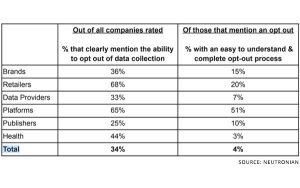The chief product officer for this cloud commerce platform previews his MarTech Conference talk about buying commerce services à la carte.

Go headless and best of breed.
That’s the key advice from Commercetools chief product officer Kelly Goetsch for large enterprises looking to expand their e-commerce. (He will dive deeper into this topic in his presentation on “How IT and marketing can use microservices to peacefully co-exist and serve the needs of customers” at our MarTech Conference next month in Boston.)
Founded in 2013, Commercetools provides function-specific cloud-based mini-applications that operate with the help of about 300 APIs. If you want to add a function to check inventory before making a sale, add that component. If you want a new kind of checkout, add that one.
This best of breed “Lego bricks” approach works well for e-commerce, Goetsch told me, because selling products is a series of discrete steps that a brand might want to customize for its unique approach.
It’s not just that buying only the commerce functions you need is a more efficient use of your budget, he said. It also means a brand can optimize for the functions it needs most.
Goetsch wrote recently in an online essay that, in this approach from his company and competitors Elastic Path, Skava and Moltin, it’s best to “think ‘spokes,’ not ‘hubs.’ “
These platforms are all fairly new to the market and aim to excel at core commerce, which is firmly aligned with the “do one thing and do it well” ethos of the larger microservices movement that’s changing how software is built. Individual lines of business (rather than IT) are increasingly building their own microservices and adding in best-of-breed applications from SaaS vendors. The goal is to build a big catalog of APIs that are each the system of record for a small business domain. In this model, you’d have one store location API, backed by a microservice, backed by a database. Anyone needing store location can hit that one API and be guaranteed to get the most up-to-date stores and their locations.
[…] If an application isn’t working out, you can just stop paying for it and switch to another in a matter of a few days.
Going headless
Brands that use Commercetools tend to build their own user interface, Goetsch noted, a “headless” approach that means they can completely customize what the customer sees.
“All of our customers have gone headless,” he said without alarm.
They also tend to be large enterprises, which have the internal software development resources needed for that customization and mix-and-matching. If it’s a relatively modest operation of $25 million annual revenue or less, he said, “go Shopify or Demandware,” referring to commerce suites with heads on them.
The à la carte approach, which he likens to how Amazon Web Services (AWS) lets you mix-and-match which cloud-based functions you need from a hosting and infrastructure service, doesn’t necessarily work for everything a marketer wants to do, he acknowledged.
He told me that marketing services, for instance, often work better as an integrated suite, “because marketing is interconnected.”
“Walmarts and Targets,” Goestch said, “build their commerce from scratch, but not their marketing from scratch.”
“Commerce is what retailers do,” he said, and the way that shoppers shop creates their brand identify. “And marketing — nobody gains that much competitve difference to build it from scratch, [so marketing] suites are better for the majority.”
Marketing Land – Internet Marketing News, Strategies & Tips
(35)








